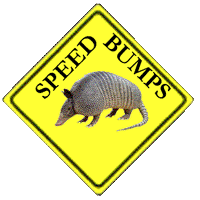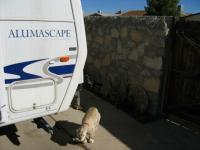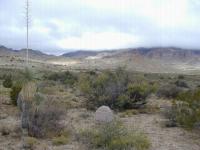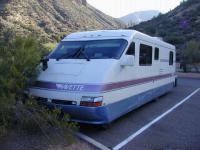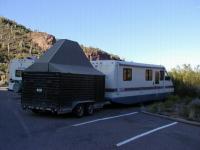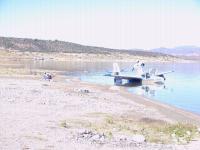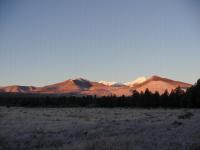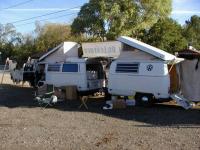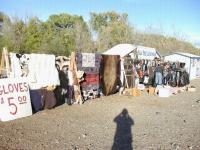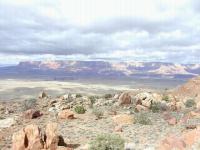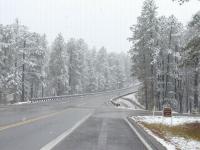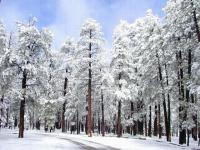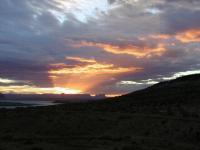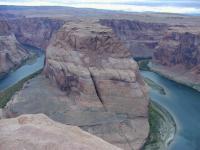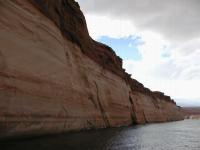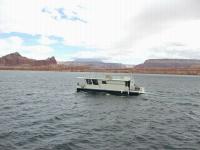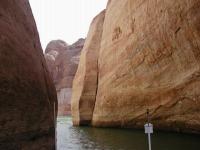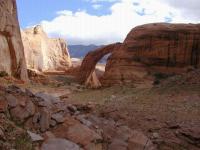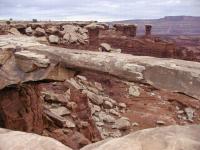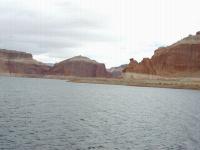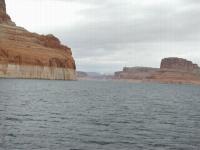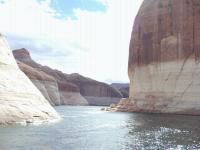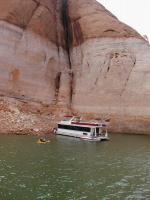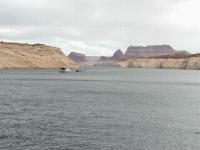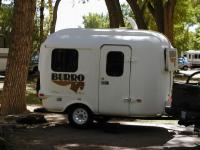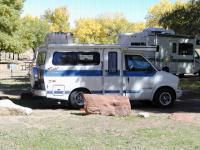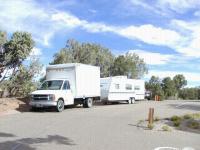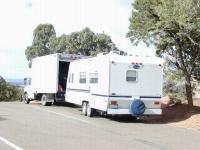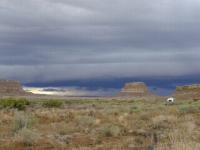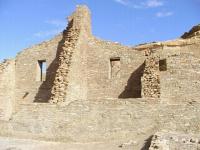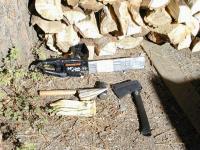December 13, 2004
Renovations
My Very Own Driveway
Georgetown, TX
Since returning to Georgetown, I've been doing some renovations on the trailer. First off, I replaced the Progressive Dynamics Intellipower 9130 converter that burnt out with a 9140. It was an easy screwdriver job, once I removed enough drawers to get to it. One to one replacement wiring is something I can follow.
It's a little like doing the hokey-pokey: you take one wire out, you put another wire in... you get the picture. Try not to shake it all about.
This morning the trailer was cold when I got up. I suspected a thermostat problem, and for once I was right on the first try. That old Coleman-Mach analog thermostat that came on the trailer had been getting more and more inaccurate. It might be 65 degrees in the trailer, and I'd have to set the switch down to 55 to get the heater to come on. This morning nothing came on no matter where I put the switch - no heat. And no AC, for that matter.
I checked the breakers just in case. They were on.
Soooo... I pried the cover off the Coleman-Mach, and immediately smelled burnt solder. Not a good sign. The internal fuse was blown. Aha. Definitely a clue. As I was prying out the fuse, I got a spark from the board. Okay, I'm convinced.
Off to Home Depot. They had a variety of Honeywells, but the programmable features were useless to me, and the cheapest was 30 bucks. Then I remembered the Hunter. Bob Hatch said something a while back about putting one of those in his Motorhome, and in fact I had bought one a couple of years ago just because it was cool and digital. But then I discovered I had to give up the two speed fan, so I took it back to WallyWorld.
Now, as it happens, I have a no speed fan, so that objection is sorta lost on me.
I went next door to Walmart, not really expecting to find it. But there it was, the Hunter 42999B, only $19.95. What a deal.
Back at the trailer, the plot thickened. I had way too many wires, in the wrong colors, and poor directions. There was a pretty good chance I was going to screw things up. So I googled around for "Hunter Thermostat" and found this URL:
http://www.klenger.net/arctic-fox/hunter-tstat/hunter-digital-tstat-instructions.pdf
You couldn't ask for better instructions. Perfectly clear. It took about 5 minutes. Now I have heat again.
And that's cool.
Here's the kicker. It is 67 degrees. I switched on the heater, set it to 68 degrees. It immediately clicked and came on. A few minutes later it clicked off, though the fan ran a little longer.
I looked. It was 68 degrees.
A thermostat accurate to 1 degree. Imagine that. Welcome to the future, y'all.
Bob
November 28, 2004
Dethroned
Back in the Driveway
About 4 or 5 months out of the year, I semi-occupy your typical 3-2 brick house in Georgetown, Texas. A poor thing, but mine own. Or will be, when I cough up another ten grand to the former Bank of Italy.
When I left to go off gallivanting last June, I had a real brainstorm. With an eye to sidestepping catastrophe, I cut off the gas to the hot water heater. Also the water at the street. Sometimes I just amaze myself with brilliance.
When I got home last week, there was every indication the plan worked. The house was still standing, amid the drifting leaves.
But it held secrets. Dark secrets.
Dumps are not usually memorable for me. But apparently, last June, after I cut off the water, I used one of the toilets, and flushed all the water out of the tank. Of course it could not refill. Both bowl and tank were completely dry when I came back.
Hey, no problem. Turn on the water. Flush. Oops.
Nowwaitjustadamminit! Why is water pouring all over the floor? It's inconvenient, at the moment. It seems to be coming out between the tank and bowl. That's cold. Not content with the evidence before my lying eyes, I flushed again. Okay, okay. One more time. Yep.
Consistency is a mother.
And evaporation, like gravity, is not always our friend. Apparently the seal dried out and cracked over the summer. Something more to put on my pre-gallivanting list.
In an attempt to prevent one catastrophe, I create another. Maybe I've discovered another Rule of RVing. Something from the Dark Side. Ever notice that the thing you prepare for is hardly ever the thing that happens?
Accident, you say? Time will tell.
I bought a new seal yesterday, from Home Depot. Today I'm planning to procrastinate with a friend. Not that I need help. I'm pretty good at procrastination, when I get round to it. But tomorrow, if you happen to drop by, you may find me waist deep in toilet innards.
Even bowl movement.
Now I'm not saying it's true, but it could be that, like me, you've occasionally lured yourself into thinking you are clever. King o' de woild. Be warned, gentle friends. All it takes is one wayward dump, and there you are. Back to the status of a stumped chump. A real knuckle dragger.
Anyway, that's the story of how I got dethroned.
I have others.
Bob
November 17, 2004
Viva Max
Outside Max's house
El Paso Texas
The strangest thing happened this morning. When I left Deming, the clouds were low. When I got to Las Cruses, they were on the ground, and it was hard to see the exit signs, let alone where they led. This continued almost into El Paso. Sort of like traveling down towards the toe of a gray wool sock.
Then, just as I passed into Texas, the clouds broke open, and the blazing sun shone down.
I swear it was just like "Welcome Home, Prodigal Son!" Or else like that scene at the railroad track in Close Encounters when Richard Dreyfuss got the asymmetrical sunburn.
But nope, no UFOs. I checked.
Not even black helicopters, despite being right across the fence from Fort Bliss. Imagine being stationed there. "Not only are you in the Army, son, but you are in Bliss. So let's see that smile!"
I went to lunch with Max from the newsgroup and his lovely bride. And successfully delayed snatching the bill long enough that he ended up with it. My social skills are improving daily. Hell, if I knew it was this easy to eat for free, I'd have retired a decade earlier.
Max even squired me around town after lunch, and I got a bunch of stuff to fix up the trailer, which has been ailing lately. First we went to a foam shop, and I bought a piece of the high density stuff 5 inches thick and 74" by 60". NO MORE AIR BEDS bottoming out mysteriously in the night.
Then we went to an RV place and got some Dicor patching and a tube of the Dicor lap sealant. Ran about 40 bucks, but I had plenty left over. Max is a heck of a host. I'm parked beside his house, using up his electricity, his stepladder, his soylent green...er, that's Simple Green, his lacquer thinner, his rags, and probably most of his patience.
But I got the roof fixed. And only glued three of my fingers together.
Unfortunately there is no Camping World here, and the one guy with an Intellipower 9140 converter in stock is mighty proud of it. So I reckon I'll manage with the Sears charger till I get home.
Couple more days. No Big Bend, no Carlsbad Cavern, no Hueco Tanks, no hesitation, no side shows, no nuthin'. I'm acomin' down the home stretch, so don't nobody git in mah way.
I wanna park in my own driveway for a while, read two newspapers a day, maybe three, haunt the library and the Barnes and Noble, listen to some real live music, and have migas for breakfast every morning.
Did I mention BARBECUE?
In other words, I'm... (gasp)... tired of traveling. Going through a phase, I guess. Should last about a week. Maybe two. Just a break for repairs.
Hope your day has been as sun filled and shiny new as mine.
Bob
El Paso Texas
The strangest thing happened this morning. When I left Deming, the clouds were low. When I got to Las Cruses, they were on the ground, and it was hard to see the exit signs, let alone where they led. This continued almost into El Paso. Sort of like traveling down towards the toe of a gray wool sock.
Then, just as I passed into Texas, the clouds broke open, and the blazing sun shone down.
I swear it was just like "Welcome Home, Prodigal Son!" Or else like that scene at the railroad track in Close Encounters when Richard Dreyfuss got the asymmetrical sunburn.
But nope, no UFOs. I checked.
Not even black helicopters, despite being right across the fence from Fort Bliss. Imagine being stationed there. "Not only are you in the Army, son, but you are in Bliss. So let's see that smile!"
I went to lunch with Max from the newsgroup and his lovely bride. And successfully delayed snatching the bill long enough that he ended up with it. My social skills are improving daily. Hell, if I knew it was this easy to eat for free, I'd have retired a decade earlier.
Max even squired me around town after lunch, and I got a bunch of stuff to fix up the trailer, which has been ailing lately. First we went to a foam shop, and I bought a piece of the high density stuff 5 inches thick and 74" by 60". NO MORE AIR BEDS bottoming out mysteriously in the night.
| I tried it. It moves about as easy as a push mower in tall grass. Ingenious. | 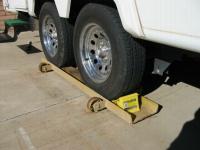 |
Then we went to an RV place and got some Dicor patching and a tube of the Dicor lap sealant. Ran about 40 bucks, but I had plenty left over. Max is a heck of a host. I'm parked beside his house, using up his electricity, his stepladder, his soylent green...er, that's Simple Green, his lacquer thinner, his rags, and probably most of his patience.
But I got the roof fixed. And only glued three of my fingers together.
Unfortunately there is no Camping World here, and the one guy with an Intellipower 9140 converter in stock is mighty proud of it. So I reckon I'll manage with the Sears charger till I get home.
Couple more days. No Big Bend, no Carlsbad Cavern, no Hueco Tanks, no hesitation, no side shows, no nuthin'. I'm acomin' down the home stretch, so don't nobody git in mah way.
I wanna park in my own driveway for a while, read two newspapers a day, maybe three, haunt the library and the Barnes and Noble, listen to some real live music, and have migas for breakfast every morning.
Did I mention BARBECUE?
In other words, I'm... (gasp)... tired of traveling. Going through a phase, I guess. Should last about a week. Maybe two. Just a break for repairs.
Hope your day has been as sun filled and shiny new as mine.
Bob
November 15, 2004
A Fresh Memorial
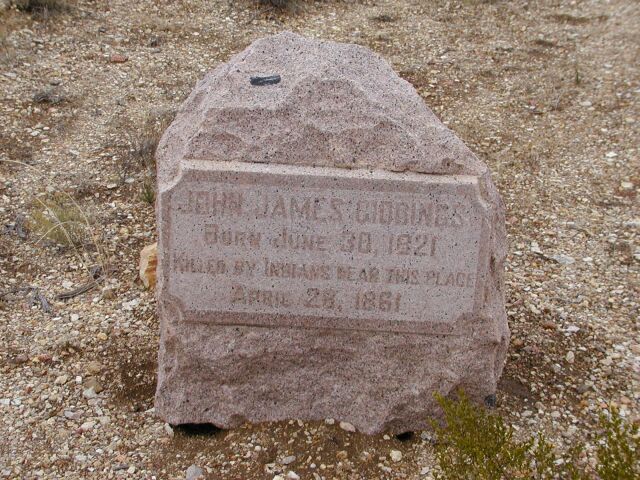 |
Rock Hound State Park
New Mexico
It may have still been frosty when the wagons left Stein's Station that morning. The mules plodded steadily along through the deep sand, round and round through the serpentine bed of the arroyo. It’s a natural road when it hasn't been raining. Rain isn't likely out here. Winds blow, sometimes all the way from the North Pole. And clouds ball up black. But seldom do they drop much cargo.
Once in a great while, though, there is a wall of water.
The Indians were mostly reasonable. Not like the Comanche country east of El Paso, the badlands they had already passed through. The natives here were not unlike a sort of weather in their own right, the way they came and went. Mostly they just passed by. Certainly they were not generally so present as to impede progress.
The biggest worry on this journey was likely to be finding a sweet spring when they needed it.
It was late April, 1861. The men were probably not particularly worried. There were thirteen of them, in two wagons, well armed, and this was a regular, scheduled trip, completed twice a month without much incident. It was known that the Paymaster of the line, J. J. Giddings, was carrying upwards of $20,000, but no trouble had come of it. Giddings assured them he had surveyed this route and "was very friendly with the Indians and felt no fear of them." He had even contracted with Cochise himself to supply hay to all the stations between Messilla and Tucson, a distance of 300 miles.
"Cochise". In the Indian language, the word meant "hard wood". And indeed, along with supplying hay, the Indian leader worked as a woodcutter at the Apache Pass station. Not far ahead of them, in fact.
The men may have had no way of knowing that an inexperienced army lieutenant named George Bascomb, only days before, had come to Apache Station and accused Cochise of stealing cattle and abducting a young boy. The charge was denied, but Bascomb attempted to subdue him, and in the ensuing struggle 3 bullets were put into the Indian leader. He escaped by cutting through a tent, but several of his relatives present were subsequently hung.
The walls of the draw grew gradually lower. It was gloomy down there, and it would have been only natural for the men to feel some small brief relief to finally rise up out of it, and emerge onto the broad open saddle on the far side of Stein's Mountain, at the end of their lives.
-------------------------------------
These thoughts, or something like them, occupied me as I dragged the fifth wheel up Hwy 80. I left Douglas on Friday. The plan was to snake up the east side of the Chiricahuas, dump the trailer in the National Forest, and make my way over the pass to the National Monument in the truck.
So much for plans. It snowed heavily during the night, and I spent the entire weekend waiting for it to melt. Mostly reading about "the Hopi Way". I finally gave up this morning (Monday) and skittered on back down to the highway, headed north.
It is November 15th. My brother's birthday. On his advice, I am headed for Stein's Ghost Town, which is about the first group of weathered buildings you see, if you look quick, on the north side of I-10 going east into New Mexico from Arizona.
I'm searching for a lost bit of family history. I am looking for a grave.
Like all history, there's a bunch of begats in this. JJ begat JS, who begat JD, who begat Leonard, who begat me. That's the short version. But histories are seldom an exclusive inheritance, and the best have a way of wandering. I guess this one really began with Giles, who lit out of Susquehanna County in 1834 bound for Texas, got caught in the struggle with Santa Anna, joined Houston's ragtag army, was shot up at the battle of San Jacinto, and died of his wounds two months later. He was 24 years old. He didn't begat anybody. A brother, Jaybez, came down to settle his estate, liked what he saw, and settled in at Brenham.
Word got back, and soon there was a minor flood of brothers.
History is a funny thing. What seems at first straight-forward turns all squirmy as you delve into it, with lots of sidesteps and many an annoying minor character demanding to be heard. We stand upright upon the past, because there's little else to stand on. But it's a bit like slow quicksand. The deeper we get, the more present it seems.
At the risk of alarming the Reader, it might be well to firm things up a bit and slide a little fill in here, from a standard source. I quote from
www.tsha.utexas.edu
------------------------------------
"GIDDINGS, GEORGE HENRY (1823-1902). George Henry Giddings, pioneer mail-line operator and stage driver, was born on July 4, 1823, in Susquehanna County, Pennsylvania, the son of James and Lucy (Demming) Giddings. In 1846 he traveled with his brother J. J. to Texas, where they joined an older brother, Jabez Demming Giddings, who was practicing law in Brenham... Giddings was hired in the fall of 1847 by the San Antonio firm of C. J. Cook and Company as a clerk. Two years later he purchased that store and one operated by Cook in Franklin (El Paso). He operated both establishments until 1861.
During this time he took over operation of the San Antonio-Santa Fe Mail Line, which he assumed from its original owner, David Wasson. Congressional action confirmed the transfer of the route from Wasson to Giddings in August 1854, but it is generally thought that Giddings began operating the route as early as July of that year. The service operated the dangerous San Antonio-to-El Paso leg of the 1,100-mile route with one six-mule team, thirty-six additional mules, and a guard of seven men. From El Paso the number of guards was dropped to three, as the line covered the safer route on to Santa Fe. In 1855 Giddings lost 270 mules and sixty horses as a result of Indian raids. A small increase in government payments authorized in March was not sufficient to make the line a profitable enterprise. Though he constantly had to be replacing stations, livestock, and supplies, Giddings kept the line operating into 1857.
The San Antonio-San Diego Mail Line contract was secured by James E. Birch on June 22, 1857. Birch named George Giddings and M. B. Bramhall his agents on the "Jackass Mail," with Giddings operating the part of the route from San Antonio to El Paso. Upon Birch's death at sea in late 1857, Giddings continued to operate the mail line with help from Robert E. Doyle and Isaiah Woods. On March 5, 1858, Giddings purchased from Birch's widow the controlling interest in the SA-SD line. However, heavy losses continued to plague the line. The government again pledged to reimburse losses incurred, but the financial burden was much greater than anyone involved could have anticipated. By 1861 Indian raids and competition from the Butterfield Overland Mail Route combined to destroy the business.
With his mail contracts canceled and most stations and supplies lost, Giddings began a trip to Washington to plead for reparations. There he encountered an old friend, James Longstreet, who influenced him to join the Confederate Army, first as a procurer of needed materials and then as head of a volunteer militia along the United States and Mexican border. There Giddings commanded troops that fought the battle of Palmito Ranch, the last battle of the Civil War, a few miles outside Brownsville. "
--------------------------------------
There. Dry as dust. Dry as bones. These summaries usually are. In 1861 his accounts were in arrears, his contracts given over to President Buchanan's old friend Butterfield. Indians were smashing his stations as fast as he could build'em. And his brother was missing, in bloody circumstances. Perhaps Longstreet didn't really find it hard to beguile George with rebellion.
You have to give the Colonel credit though. He was the stubborn sort. He was still winning battles for the Confederacy for some period after Appomattox.
But it isn't George I'm off to find today. He ended up buried in Mexico City. I'm looking for his brother. I'm looking for JJ. I'm looking for my great great grandfather.
He left six children in San Antonio. All little, one unborn. His wife died a year later. The children were gathered up by a great aunt and bundled off to New York State, where they spent the war. Most of them made it back to Texas later.
I stopped at Stein's Ghost Town, spoke to the proprietor, Larry Link. He let me drop off the trailer there, and gave me directions to the ruins of the old station, across the railroad tracks and 14 miles up a soft dirt road. There's a cold wind, and it looks like rain. If this miserable track gets very wet, it's going to be hell getting back.
---------------------------------------
Less than a week after the massacre, Thomas Rogers, JJ's brother-in-law, came looking for him. The following letter is the only first hand account of his search that survives:
"Tucson, New Mexico
June 8, 1861
Dear Parents,
When I wrote you last, the 9th of May relative to the death of J. J. Giddings, I then thought to be able to give you all particulars as soon as the 19th, but it has been impossible to do so as there has been no mail communications between here and El Paso since he was killed.
The party was attacked at or near Steins Peak where we found the coach or all that remained of the running gear, but no trace of any portion of their remains where they had been buried or burned. And the only conclusion we could come to was that they had been taken prisoners, carried off and murdered. We found remnants of the clothing and a pair of gauntlets belonging to James which were covered with blood and which I have now sent forward to Mrs. J. J. Giddings by mail. We also found one mile this side, where they were killed, two men hanging up by their legs, where they were burned to death. Judging from the number of wigwams and where they had been encamped, there must have been about 150 Indians."
----------------------------------------
I found the ruins, and the arroyo, and followed it to the fence line separating New Mexico and Arizona. Larry said to follow the fence south until it doglegs west, then walk up the hill towards Stein's Peak. Then look back down. Nothing. Up here, one rock looks much like another. There are low bushes everywhere, though nothing resembling a tree you could hang someone from. It's cold. I could wander around out here for days.
| Wait. What's that? | 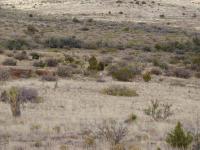 |
-----------------------------------------
( Extract from diary of Mrs. C. M. Noble written as the stage coach traveled through Apache Pass and Steins Peak on their journey from San Francisco, California to San Antonio, Texas in the year of 1861. )
"May 25,1861 Six miles from Apache Pass eastward. We came through the much talked of Apache Pass yesterday and were not molested by the Indians at all, though we stopped over two hours in the Pass to water, however we kept a strict lookout all the time. It was as bad a pass as had been represented. Close to the western end of the pass we saw 4 or 5 Indians hanging in 2 trees and farther on we saw the remains of some wagons where the Indians had taken some Spaniards and Cherokee Indians and tied them to the wagons and burned them - the grave where their remains had been interred. The sight made me feel bad.
Stein's Peak. We arrived here at about 8 o'clock last night. We traveled about 30 miles yesterday though according to the card it was only 25. We nooned at San Simon, Mr. Lowery's folks remained there. They withdrew from our train at Dragoon Spring because they could not have their way in all things. Our black horse gave out before dark and we had to leave him in the Pass. I felt very sad but was saved from repining and Moses and I united with thankful hearts in singing that verse
Thus far the Lord hath lead me on
Thus far His power prolongs my days
And every evening shall make known
Some fresh memorial of his praise.
It was after dark when we got to the station which was a ruin, situated close to the mouth of the canyon. As soon as the horses were watered, we left and came a mile and a half into the valley to grass. We heard at Tucson that 7 men had been murdered close to this station two or three weeks ago and this morning the bones of two of the men were found close to our camp. Our men carried them to the road side and buried them. They then piled stones on the grave and placed a board at the head on which was written as good a description of them as they could give."
-----------------------------------
The true location of the grave, if there is one, can never now be known. Few could be sure of it in 1861. No one could in 1917. And certainly I am not now.
I found the marker, though:
John James Giddings
Born June 30 1821
Killed by Indians near this place
April 28, 1861
The lettering seems as crisp and unweathered as it must have been in 1917. It sits all alone on the northwest slope of Stein's Mountain, I suppose where the Mexicans left it. Take a right at the corner where the fence dodges west, count off 31 posts, look upslope. Small flat rocks, which serve as flowers in the desert, have been stacked in piles behind it.
I have seen these little cairns before. Many places. On top of mountains. Alongside trails. They are anonymous statements. Impromptu memorials. They say someone was here. Someone noticed. Someone made it this far. I added my rock.
It's been a long time, JJ. Thanks for life.
Rest in Peace.
Bob
November 5, 2004
Implausible RV Stuff

Canyon Point Campground
Near Show Low Arizona
I haven't been sleeping well since the election. And no, it's not Angst. Kerry's hopes were not the only thing that collapsed last Tuesday.
So did my airbed.
This is the fifth one to fail. The Aerobed I started out with a year and a half ago lasted about 6 months. Cost about $150. Then I went through a couple of $30 Instabeds I bought at Sam's. Four months on one, and maybe a month on the other. In Farmington I paid about $80 for a fancy one, supposedly ruggedized, and with a piece of 1 inch memory foam built in. Super comfortable. Lasted a month. Then back to another Aerobed. Less than 30 days.
I give up. I never can find a rip, or a tear, or even a pinhole. No sign at all of a leak, other than the fact that my butt hits the plywood in the middle of the night. I've never been anywhere that it was convenient or practical to completely immerse these things, but pouring water over them never reveals any bubbles.
But my bubble butt still bites the boards.
This never happens at home. I am driven to the conclusion that people who actually travel in their travel trailers have to give up the comfort of an air ride. At least if, as I do, they travel from 500 feet to 13,000 feet in altitude. Up and down the back roads, from 6000 feet up to 8,000, then down to 3000, etc. La, la, la. Nary a care til I try to sleep.
They work fine for a week or three. I haven't a clue why I can never find the leaks.
But the next time I come across an upholstery supply house, I'm gonna buy 6 inches of firm foam in a queen sized slab, and this problem will be history. Goombye.
No doubt something else will turn up.
Case in point. When I was walking out of the Walmart in Payson, I stopped to talk to a young girl at the entrance who was giving away kittens. Almost had one of those touchy-feely moments my Republican friends are always warning me about. No doubt about it, seven week old kittens are darned cute. But then I looked over in my basket, which contained a bright green box.
Air Mattress # 6.
Lessee, kittens have claws, don't they?
But I've seen crazier things lately than buying a kitten and an air mattress on the same day. Maybe I should make a list.
1. Going up to Jacob Lake, I met a Bounder Motorhome of indeterminate age dragging a truck for a toad. In the bed of this truck rode a semi-V Glastron boat, perhaps 16 feet long, with its nose stuck up in the air.
I kid you not. The bow rose above the back of the Bounder. Maybe 12 feet high. The transom was wedged down against the tailgate. The hull rested on a ladder rack. I don't know how they got it up there, or how they expected to launch it. But they were headed rapidly toward serious water at Lake Powell.
I want one.
3. There are a series of campgrounds at Lake Roosevelt. Hundreds of sites in the middle of a Saquaro desert briefly interrupted by the reservoir. And there is no way to get fresh water into your RV except with a bucket. No faucet at the dump station. No faucet at the campsites, except for the camp host's site. No faucet for 10 miles around.
Bring a bucket.
There's no electric sites either. This is the largest all-solar campground in the US, I am told. This is not as stupid as the water situation, but I have come to prefer a site with electric hookups even when I don't need electricity. The reason is simple. In a camp with electric sites, there is no need to run a generator. There is the faint possibility of silence during sunset. But not at Roosevelt Lake. All summer long this hillside must roar and mutter and seethe under the stars even as Egypt did, on that black and fateful night the fabled Mosaic locusts descended.
4. I have gotten quite used to signs up in the Colorado forest that insist you must pull off the road at least 200 feet, or 300 feet, or some such, to camp. The distance varies, but not the insistence you better get outa sight. Up in the Tonto Forest, along the Mogollon Rim, I turned off to visit Black Bear Lake and encountered one of those official brown and white signs informing me "No Camping MORE Than 300 Feet From Road."
5. Here's another indication that Arizona marches to a different drummer. Since Congress turned over most if not all National Forest campgrounds in the mountain west to "private enterprise", the bulk of them are closed from November to May. At Tortilla Campground on Apache Lake, a sign said "Campground Closed May 1st TO November 1st".
Gotta love it. Maybe it's just too hot for summer camping here. The cliffs opposite did appear to have scorch marks.
But right now it's 72 degrees, and I'm camped at the only National Forest Campground in Arizona that has electric sites. I'm the only one here.
And I've just discovered the reason.
It seems someone has chosen this afternoon to conduct a "Prescribed Burn" nearby. It started just after I pulled in here and paid. A couple of hours ago.
Now visible smoke is beginning to curl toward me, through the tops of the pines.
Wish me luck.
Bob
November 3, 2004
Post Election Paddle
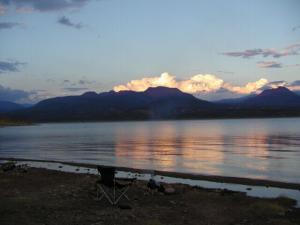
Bachelor Cove
Roosevelt Lake, Arizona
Tuesday night I stayed, for only the third time in my life, in a commercial campground. The Spring Creek Inn and RV Resort. I wanted to charge up the batteries and watch the election coverage. Seemed like a good idea.
This campground in Roosevelt is on something of a low hill, across from the post office. While I was checking in, I admired an framed aerial photograph of the area. Vivid in the foreground was something I had not seen from the road: the green oasis of a golf course. Right across the street.
"That's pretty."
"Our golf course? It's closed. Got flooded."
"Flooded? From the lake?"
"Sure. We got 7 inches of rain. Closed down the road. Left big rocks all over the place."
My God. It's several miles down to the lake.
"Does this happen often?"
She laughed. "Often enough. Around here, it never rains. Then it rains all at once. And the Salt River brings it right through here."
The Salt River. Impressive. That settles it. I'm headed up to Show Low, and down that canyon. Unless, of course, it rains.
Then she told me the cable TV was out.
"From the flood?"
"Nah. The guy just shut it down. One night his wife died, and he said to heck with it. He drove over to the shop, shut it off, locked up, and left. That was right in the middle of the second Presidential Debate. Didn't say nothin' to nobody."
"I bet that made people real happy."
"Lots of complaints, but he don't care. We've been scrambling around ever since. The motel's on antenna, but the camp ain't hooked up yet."
What the hell. It's only TV. This place looks quiet. I can get PBS and NBC on the batwing. There's power. Twenty bucks. That's good enough.
I gave up on the election before it was over. About midnight.
"Looks quiet." Did I say that? Right. Looks got nothing to do with quiet. At 5:30 in the morning somebody started up a big diesel and ran it for 25 minutes before finally rattling out the front gate.
Then, just as I was getting back to sleep, somebody cranked up a stereo...boompbaboomp, boompboompbaboomp. About ten minutes of that. Seemed to come and go, like through a door. Then I noticed the air bed was almost flat. Great.
Tick. Tock. Tick.
Dawn came slowly, gray and gritty. Or maybe it was just me.
After breakfast at Ma's Kitchen, I dragged the trailer down here to Bachelor Cove. Waaay down to the end, away from everybody. After listening to Kerry's graceful concession speech, I wanted to break something. But heck, I'm too tired. I lay back on the couch. Closed my eyes.
RRRRRRRRRRRRRRRRRRRRRRR. Rrrumble rumble rumble rumble....
Maybe I'm not too tired. A boat? I flung open the door, grinding my teeth.
Unbelievable.
I looked around. This guy had hundreds and hundreds of miles of empty shoreline to inflict himself on, and he zeroed in on me, out on this damned deserted spit.
"YOU CAMPING HERE?" I had to yell. To be heard over the boombox.
Yeah, that's the reason.
He looked around, as though surprised to find me there.
"No. Just gonna relax here a couple of hours."
I considered homicide. It would be a mercy. Really. An act of kindness.
It was a close thing.
But in the end I cranked up the truck and took the kayak over to Apache Lake, below the dam at 3 mile wash. Nobody around but one guy in a skiff, fishing, out by the island. No boombox in evidence.
An hour of paddling should settle me right down.
On the way upriver I ran across a dozen redheaded ducks, chasing them from spot to spot to spot along the far shore. They didn't seem to mind moving, and never let me get very close. But after a while you could almost see them looking around and thinking: "Who IS this guy?". Below the dam there was a barrier of barrels cabled across the lake. They escaped into the water beyond it.
There was a lot of racket overhead.
A hawk was up there imitating a falcon, trying to take a gull right out of the sky. He wasn't very good at it. Whenever she got a little beneath him, he'd close his wings and start to pick up killing speed. She'd just squawk and flap higher, making him veer and climb. Another gull kept coming helpfully between, making him angle, but not so close as to get tangled up in talons. I don't think this hawk was big enough to handle a live struggling gull in flight anyway.
But he was certainly willing to give it a try.
The gulls were taking the situation very seriously. But they seemed awkward, as though unused to being badgered this way. Aside from all that incessant inconsequential squawking, their principal strategy seemed to be to stay just above or level with the hawk, and wear him out. Gradually it worked. While I floated there and watched, the distance between slowly widened, all of them gyring, up and up and up, finally drifting out over the dam.
On the far side of the water, a heron perched slumpshouldered on a foamfilled floating barrel, phlegmatic, silent, unconcerned with the melodrama, apparently indifferent to the possibility of personal hawkstrike. Probably too big to be carried off. Seemed to be asleep.
Suddenly it dove down, cutting the water cleanly, without preamble. It did not come back up.
I took it easy on the way back, floating downstream with the current, close to the rocks. On either side saguaro marched upslope like a procession of tall green troopers.
No hurry here. I hoped, absent all the heavy breathing and paddlesplash, to sneak up on some wildlife.
But not much happened.
After a bit there was a low hum above. A grey dot against the blue, speeding west. Toward Phoenix. Perhaps my floatplane friend. Or another like him.
Unbelievably, -pht,pht,pht,pht- a heron flew right over my head from behind, maybe 10 feet up. It swooped down low to the water, stretched out its neck, and made a strangled harsh shuddering cry.
Rrr-ru-ru-ru-ru-ruhhhh-kuh-kuh-k-k-k!
Made my throat hurt, just listening to it.
Cars passed by invisibly on the bluff above, raising a shimmer of trailing dust.
Drifting along, barely moving, I could hear the drone of crickets.
The wind's slow sigh.
The lap of water against the boat.
And underneath that, behind and between, holding it all together, the deep still silence of the world.
Waiting there.
Waiting.
I could elect, I could choose to stay out here. Crawl back up one of these side canyons, like a lizard. Become a hermit. Never say another word to anyone. Least of all myself.
How long could I last like that? Would it matter?
Sunlight bounced and dazzled on the water.
At that moment, before the floating thought had quite solidified, I rounded a curve and saw the truck waiting there.
Waiting.
Waiting to take me back.
Bob
November 1, 2004
Dead Horse Bounce
Roosevelt Lake
Arizona
I got a lot of flack from the somewhat locals over my lack of enthusiasm for Dead Horse State Park in the last installment.
For example, Anne Watson called it "one of my favorite places" and wrote:
"Bob, you have to understand us Arizonians. Any river in Arizona that has real water flowing in it is a real treat for us. The one just north of my house flows Maybe during a rain storm and then just quits dead till the next storm..."
Point taken.
There's lots of ways to travel. Pick one.
You can range far and wide, as I've been doing, taking the long view, checking off the list of available transcontinental wide-screen Cinerama spectaculars. Lake Superior. The Icefields Parkway. The so-called "Pacific" Ocean. The downside is that local wonders will sometimes seem a bit tawdry, a little tarnished, after two weeks at, say, Lake Powell and the Grand Canyon.
One can surfeit on grandeur. It makes your eyes ring. While you are still goggly, you might misunderestimate the merely impressive.
Often it's just as well to stay home and pay close attention to what happens to wander, or flow, or fly by your door. As my friend Luis Gutierrez once said, in a context more ribald : "You never see no spider chasin' no flies."
Walden Pond is all the world for those with eyes to see. And so with the Verde River in Cottonwood, Arizona.
Here's a thought: go crazy, buy a microscope. You can find a plenitude of wonders a muddy footprint. You don't need a "Red Rock Pass" from the National Forest Service to watch Van Leevanhook's "wee beasties" wage their desperate and colorful battles every second of the day.
But sometimes I'm just not going to be in the mood. You can't see everything. Or anyway I can't.
So. Tell you what I will do. As an Internet special, one time offer, available nowhere else, here's a guarantee: what you read here is going to offend practically everyone at some time or other.
All you are ever gonna get here, unfortunately, are my reactions and thoughts about things that happen to me. I will make no pretence of being even-handed. Indeed, on any particular day I am pretty sure to be unfair.
Absent the proper caffeine load, I will absolutely turn crotchety.
Just you watchety.
Bob
Arizona
I got a lot of flack from the somewhat locals over my lack of enthusiasm for Dead Horse State Park in the last installment.
For example, Anne Watson called it "one of my favorite places" and wrote:
"Bob, you have to understand us Arizonians. Any river in Arizona that has real water flowing in it is a real treat for us. The one just north of my house flows Maybe during a rain storm and then just quits dead till the next storm..."
Point taken.
There's lots of ways to travel. Pick one.
You can range far and wide, as I've been doing, taking the long view, checking off the list of available transcontinental wide-screen Cinerama spectaculars. Lake Superior. The Icefields Parkway. The so-called "Pacific" Ocean. The downside is that local wonders will sometimes seem a bit tawdry, a little tarnished, after two weeks at, say, Lake Powell and the Grand Canyon.
One can surfeit on grandeur. It makes your eyes ring. While you are still goggly, you might misunderestimate the merely impressive.
Often it's just as well to stay home and pay close attention to what happens to wander, or flow, or fly by your door. As my friend Luis Gutierrez once said, in a context more ribald : "You never see no spider chasin' no flies."
Walden Pond is all the world for those with eyes to see. And so with the Verde River in Cottonwood, Arizona.
Here's a thought: go crazy, buy a microscope. You can find a plenitude of wonders a muddy footprint. You don't need a "Red Rock Pass" from the National Forest Service to watch Van Leevanhook's "wee beasties" wage their desperate and colorful battles every second of the day.
But sometimes I'm just not going to be in the mood. You can't see everything. Or anyway I can't.
So. Tell you what I will do. As an Internet special, one time offer, available nowhere else, here's a guarantee: what you read here is going to offend practically everyone at some time or other.
All you are ever gonna get here, unfortunately, are my reactions and thoughts about things that happen to me. I will make no pretence of being even-handed. Indeed, on any particular day I am pretty sure to be unfair.
Absent the proper caffeine load, I will absolutely turn crotchety.
Just you watchety.
Bob
October 30, 2004
Seldom Seen
Dead Horse State Park
Arizona
If registrars are this efficient all over the country, there's going to be a bunch of gypsies, like me, that don't get counted.
I arrived at the volcano in the dark, and found the campground closed and gated. I slept by the side of the road, in a turnout, beneath one of several "no parking" signs.
Necessity is a mother, ain't it?
My converter blew a fuse again. I am increasingly convinced this is caused by the Charge Wizard. It does not happen when it is not plugged in, and the function light in the thing is out. In any case, it has been almost a week since plugging in. The generator just doesn't keep up with it. Time to find another outlet.
I drove the circuit round from Sunset to Wupatki, stomping briskly through a couple more ruins, trying to stay warm. Hate to say it, but after a month in northern Arizona, I'm about ruined out.
But it must have been something to see, on a certain morning over a thousand years ago. To feel the ground shake, and the earth roar and rise up. They must 've run away for all they were worth, but how could they fail to look back? Even as Lot's wife, everything they knew, everything they had, was being buried around them, under cinders and ash.
No doubt it seemed the world was ending. For some of them, it did.
There's a crackle of ice in shadows along the road this morning, even though it hasn't rained. Maybe it's time to go south for the winter. Time to turn toward home. Odd how all migrations are ultimately circular, no matter how long they take.
Home. Why does it always looks so different, when you come back round at last?
Eliot had a line about that:
"You cannot face it steadily, but this thing is sure,
That time is no healer: the patient is no longer there."
Lots of snow piled up in Flagstaff, and several of last night's wrecks still to be towed away. But the roads are clear, where they are not blocked.
Several people had told me to be sure and drive down Oak Creek Canyon. Well, I've seen it, and it looks a bit like suburban Los Angeles has been crammed down into what may once have been a pretty little canyon.
Sedona is the epicenter of a fashionable demographic disaster.
It's late October. Nearly Halloween. This has to be the off season, but every parking lot is full along the road. There must be fifty cars parked at Slide Rock State Park. No chance of getting a trailer in there. Oh, and they charge for parking - "Red Rock Pass Required" - like this was a cutesy Disney enterprise instead of a national forest.
Hell. Maybe it is. "Come visit 'Canyonland'. See what all the fuss was about! Buy your tickets here!"
God knows what sort of crowded hell this little slot is in the summer. Once upon a time it mighty have made a nice small national park, but it's way too late now. Might as well sell it off and line it with McMansions.
The clutter of cuteness that is modern Sedona begins to clear out a bit toward Cottonwood, which is where I pulled into Dead Horse State Park. It's a typical desert campground. A few sites down along the trickle of a sometime stream, among the straggly mesquites, and many more above, spaced out to make a sandy parking lot. About all it really has to recommend it is an electric outlet at every site.
And that's enough.
I paid the $19 and went back into town, on a quixotic hunt for No. 6 Melitta coffee filters. That's the size of funnel I have. These things have mysteriously almost disappeared from grocery shelves everywhere. When I find them, I buy in bulk.
No luck in Cottonwood. But I did find "Seldom Seen Steve".
I bought a belt. I've only had two belts since 1973. And the same belt buckle. I bought the buckle at a BBQ joint next to a dance hall in Copeland Texas. It's what I did that night instead of getting laid. It's a solid brass Armadillo. I bought both belts from a leather worker at the Renaissance Market on the Drag in Austin.
I can't find a good belt in a store. I'm not talking about a "dress" belt. I've got a couple of those flimsy things, of course, and wear them about as often as I wear a suit.
I bought the first belt from a couple in their twenties, and came back about 18 years later to find the guy still running the stand, in about the same place. So I bought another. He said he recognized the pattern as his wife's work. In the interim she'd run off to Hawaii to be an acupuncturist.
I tried to hook up with him a couple of times in the spring, but he comes and goes. Seldom seen. But from what I'm told he still shows up from time to time. Steve listened as I told this story.
"It's one thing to peddle piece work in your twenties," I said, "and maybe sell a little pot on the side. It's an adventure. But it's odd to find a guy doing this stuff for his whole life."
Oops. Have you ever tried to close your mouth before the words got all the way out, and fail? I have.
And there you have it. That's why I've got a new belt. Purchased out of pure embarrassment.
O well, it's been 13 years or so. It's time. And it's a pretty good belt, though maybe not the equal of the earlier two. Inch and a half, plain brown, full grain cowhide. Fourteen bucks.
It'll do, to hold my pants up. Maybe I should get another for my mouth.
Maybe in another dozen years.
Bob
October 22, 2004
A Hole in the Ground
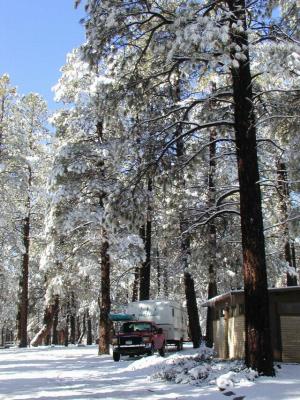
North Rim Campground
Grand Canyon
I've been waiting in the rain at Page for my ballot to show up. It didn't. I guess they are overwhelmed down at the Williamson County Clerk's Office. Helluva a way to run a country. It might be a while. I decided to go have a look at a hole in the ground.
The trip to the North Rim is pretty spectacular in itself. You go down and then up the Vermillion Cliffs. In a turnout halfway down, I stopped to take a couple of pictures, and look over a line of Navajos selling trinkets and jewelry. There was a bunch of Germans on a junket there, all of them on big bikes, and between the guttural gabble, the blat and mutter of the idling bikes, and the crowd pushing and shoving, it was hard to get anywhere near those card tables.
That's all right. The last thing I need is jewelry.
The tourists, however, were quite a sight, all dressed up in leathers and attitude. But even when playing at being the "Wild Ones", their meticulous native penchant for organization asserted itself. For instance, this middle-aged band of Brandos was followed everywhere by a big panel van full of tools, coolers, tires, and assorted spare parts. Probably an ATM back in there somewhere.
Wild. But not too wild.
I crossed the Colorado at Marble Canyon. Snapshots can't capture this country. You can only take pictures of the parts, and tiny parts at that. It is the whole that is truly impressive. The parts are ordinary. Sand and rock. A few stunted plants. That's what is in the pictures.
I took a bunch anyway.
While climbing back up, and onto the Kaibob Plateau, I met a ski boat crammed into the back of a pickup. It rested at a sharp angle on the ladder rack, its nose stuck high in the air. The truck itself was being towed by a motorhome. The whole thing looked so weird, and flashed by so fast, that it took a minute to figure out what it was I just saw.
Jesus. How the heck are they gonna launch that?
Then it started to snow.
I started down the road to the canyon, but in just a few miles there was nearly a whiteout. Strong wind. A big sign, stating that the road ahead was not plowed. Hmmm. You know, this might be a good time for lunch. Yep. I found a wide place to turn around and went back. Sat by the fireplace. Read a week old paper. Had a milkshake. Dum de dum.
I was contemplating the likelihood of plowing down a snowcovered slope, pushed by the trailer. That happened to me last year, at the Black Canyon of the Gunnison. I got out my best manners. Rubbed off some of the rust. And somehow got permission to drop the trailer across the road from the parking lot.
Better safe than sorry. Even cliches are sometimes true.
Things lightened up a bit. I set off in the truck. As luck would have it, not more than 10 miles down the road, the skies opened up and the forest dazzled in broad sunshine. I met two snowplows. What the hell.
I drove straight to Angel Point on a smooth, dry, paved road.
| Unfortunately the Canyon was filled with cloud. I took a picture anyway. | 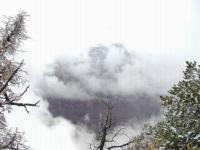 |
So I drove back 45 miles and got the trailer. Twenty bucks worth of gas, offered at the altar of the gods of caution.
Slippin' and slidin', somehow I got into a campsite just as the sun went down. Right next to the bathroom. Then I snaked an electric cord under the Men's room door. And there you have it. A free electric site, and solitude to spare.
I looked across at the only other camper. An truck had appeared beside the popup. Seemed blue and cold and miserable over there, back under the trees.
So I went inside and cranked up the heater.
God, is it quiet here. I could get used to this. Every now and then, for no particular reason, you find an unexpected crack in the proper scheme of things, and get a little more than you deserve.
In the middle of the night I woke up. I don't know why. I slid the window back, and looked out at magic. Moonlight on the snow. I got up and dressed, and went for a stumbling, wondrous walk. Stark bars of light and shadow lay between the trees. Snowcrust crackled beneath my boots. The moon was full, and ruled the world. My breath was smoky, rising in the crisp air. I was a dragon in the night.
Somewhere in there I decided that the secret of traveling well is knowing when to stop. This might be a good place.
I didn't care.
| It was a wonderland. | 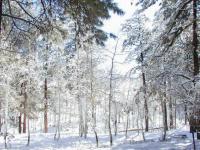 |
Bob
October 21, 2004
A Desert Drowned, Part Two
Lone Rock Campground
Lake Powell, Arizona
Round and round.
We passed the mouth of Antelope Canyon, a narrow cut that goes a considerable distance back into the Navajo Nation. Far enough to support a thriving industry of tour guides. Antelope is famous for its high walls, "narrow, eerie slots", and for a flash flood that took 11 lives back in 1997.
My neighbor back on Jemez Creek above Albuquerque had told me about getting caught in something like that, out here somewhere. He and his wife were puttering around in a small canyon, getting ready to fish, when suddenly the wind whipped up and came roaring down the slot, and water with it. He had about half a minute to decide whether to abandon the boat and climb, or run for it. He turned and ran. Thank God the motor didn't stutter, and they didn't meet a tour boat coming in. That wall of water partly caught and pushed them, but gradually the force was spent as the channel turned and widened and turned, and then they were out in the main channel.
The odd thing, he said, was that looking back you couldn't tell anything had happened. Just dark clouds overhead, and a strong breeze.
Much like today. A typical heartbreaker of a day, if you happen to be a Navajo farmer. All clouds and no rain. Every now and then I think I feel a drop, but it's just spray from the keel cutting the water.
That stops as we turn a corner and troll slowly past Antelope Marina. Everything is being expanded here, perhaps doubled in size. They are going to have slips for over 300 houseboats. Some monsters are already in place. Houseboats? HouseMansions, more likely. Megabucks stored away here, hidden in an ancient crook of the Colorado, calmly riding the lake level down as the drought goes on and on.
Some of these barges look like they'd have trouble negotiating this channel. They'd certainly want to try it one at a time. Back and fill, like a motorhome trying to get into a California Stopandshop for gas.
Back in the not-so-old days there was no place to cross the Colorado anywhere within 200 miles of here, but that didn't stop a party of Mormon settlers. They just blew up the side of a massive cliff to widen a crack, and used ropes to lower wagons and horses hundreds of feet down the canyon walls.
Give some guys a little gunpowder, they are apt to redefine the term "accessible".
It wasn't quite as much fun as watching Mormons blow up stuff, but all we had to do from then on was just kick back and enjoy the ride down the middle of the main channel for an hour or so, until we reached the narrow canyon that led to the "world's largest natural rock span". Helpfully, the Park Service has placed a floating sign in front, so you can't miss it.
The predominant colors in here are rust and chalky white, with a fringe of green on ledges here and there. Apparently there's nothing alive out here larger than a crow, the frankenstein of squawking birds.
Apart from you and me, that is.
Round and round and round.
The Rainbow Bridge cannot be seen from the boat, this time of year. Or any time in the last four years. It's a mile and a quarter walk, along a dry creek where small brush is beginning to take hold where water ought to be. A floating dock is gradually pushed up and down the creek as needed. A Korean couple carried a pram with their toddler in it most of the way up, shedding clothes as they climbed.
The air grew rapidly warmer as we climbed.
As you might expect in a National Park, there's a "Don't climb on the Arch" sign. Something to that effect. Oh, and don't pass under it. The Navajos don't like that, or at least the old ones didn't. Since both acts are difficult, or at least require effort, for once I had no difficulty following the rules.
Back at the dock, the water was roiling with enormous carp and striped bass, which apparently have become addicted to the potato chips included in the box lunch that comes with the tour. Some of these fish were monsters. Charlotte said someone had caught a 48 pound striped bass up here.
These were about a quarter that size. If the bass get that big, then somewhere in this lake there is a carp large enough to eat your boat.
You have been warned. Dum-dum. Dum-dum. Dum-dum, Dum-Dum. Harry, did you hear that? Harry?
The trip back was relaxed, the same views seen anew from a different angle. The few flashes of sunlight we got on the way down had disappeared, and the dark clouds grew close, but still it didn't rain. Most of my photographs were spoiled by the darkness, and rendered slightly out of focus by the motion of the boat. I suppose there may have been some ineptitude involved. I've only had the camera 5 years or so. Someday I'll get around to reading the directions.
I stayed topside. It was a fine ride.
It's supposed to clear off a bit on Friday. I'm headed down to the North Rim of the Grand Canyon. I hope none of this wet stuff turned to snow. If not, the road should still be open. Then I have to return to Page to pick up my mail-in ballot. After that particular date with destiny, I'll have to decide whether to go up to Bullfrog Basin and rent a boat, or resume my trip south into the Hopi lands.
The weather will tell me where to go. How's that for a plan? It's about as organized as I get these days.
There it is again. That stupid grin. Sometimes I just can't get it off my face.
Bob
Lake Powell, Arizona
Round and round.
We passed the mouth of Antelope Canyon, a narrow cut that goes a considerable distance back into the Navajo Nation. Far enough to support a thriving industry of tour guides. Antelope is famous for its high walls, "narrow, eerie slots", and for a flash flood that took 11 lives back in 1997.
My neighbor back on Jemez Creek above Albuquerque had told me about getting caught in something like that, out here somewhere. He and his wife were puttering around in a small canyon, getting ready to fish, when suddenly the wind whipped up and came roaring down the slot, and water with it. He had about half a minute to decide whether to abandon the boat and climb, or run for it. He turned and ran. Thank God the motor didn't stutter, and they didn't meet a tour boat coming in. That wall of water partly caught and pushed them, but gradually the force was spent as the channel turned and widened and turned, and then they were out in the main channel.
The odd thing, he said, was that looking back you couldn't tell anything had happened. Just dark clouds overhead, and a strong breeze.
Much like today. A typical heartbreaker of a day, if you happen to be a Navajo farmer. All clouds and no rain. Every now and then I think I feel a drop, but it's just spray from the keel cutting the water.
That stops as we turn a corner and troll slowly past Antelope Marina. Everything is being expanded here, perhaps doubled in size. They are going to have slips for over 300 houseboats. Some monsters are already in place. Houseboats? HouseMansions, more likely. Megabucks stored away here, hidden in an ancient crook of the Colorado, calmly riding the lake level down as the drought goes on and on.
Some of these barges look like they'd have trouble negotiating this channel. They'd certainly want to try it one at a time. Back and fill, like a motorhome trying to get into a California Stopandshop for gas.
Back in the not-so-old days there was no place to cross the Colorado anywhere within 200 miles of here, but that didn't stop a party of Mormon settlers. They just blew up the side of a massive cliff to widen a crack, and used ropes to lower wagons and horses hundreds of feet down the canyon walls.
Give some guys a little gunpowder, they are apt to redefine the term "accessible".
| From there on it was just vista after vista, with miles and miles of side canyons coming into view. Out here in the middle it doesn't look like the lake is low. | 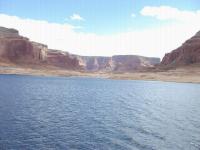 |
It wasn't quite as much fun as watching Mormons blow up stuff, but all we had to do from then on was just kick back and enjoy the ride down the middle of the main channel for an hour or so, until we reached the narrow canyon that led to the "world's largest natural rock span". Helpfully, the Park Service has placed a floating sign in front, so you can't miss it.
The predominant colors in here are rust and chalky white, with a fringe of green on ledges here and there. Apparently there's nothing alive out here larger than a crow, the frankenstein of squawking birds.
Apart from you and me, that is.
Round and round and round.
The Rainbow Bridge cannot be seen from the boat, this time of year. Or any time in the last four years. It's a mile and a quarter walk, along a dry creek where small brush is beginning to take hold where water ought to be. A floating dock is gradually pushed up and down the creek as needed. A Korean couple carried a pram with their toddler in it most of the way up, shedding clothes as they climbed.
The air grew rapidly warmer as we climbed.
As you might expect in a National Park, there's a "Don't climb on the Arch" sign. Something to that effect. Oh, and don't pass under it. The Navajos don't like that, or at least the old ones didn't. Since both acts are difficult, or at least require effort, for once I had no difficulty following the rules.
Back at the dock, the water was roiling with enormous carp and striped bass, which apparently have become addicted to the potato chips included in the box lunch that comes with the tour. Some of these fish were monsters. Charlotte said someone had caught a 48 pound striped bass up here.
These were about a quarter that size. If the bass get that big, then somewhere in this lake there is a carp large enough to eat your boat.
You have been warned. Dum-dum. Dum-dum. Dum-dum, Dum-Dum. Harry, did you hear that? Harry?
The trip back was relaxed, the same views seen anew from a different angle. The few flashes of sunlight we got on the way down had disappeared, and the dark clouds grew close, but still it didn't rain. Most of my photographs were spoiled by the darkness, and rendered slightly out of focus by the motion of the boat. I suppose there may have been some ineptitude involved. I've only had the camera 5 years or so. Someday I'll get around to reading the directions.
I stayed topside. It was a fine ride.
It's supposed to clear off a bit on Friday. I'm headed down to the North Rim of the Grand Canyon. I hope none of this wet stuff turned to snow. If not, the road should still be open. Then I have to return to Page to pick up my mail-in ballot. After that particular date with destiny, I'll have to decide whether to go up to Bullfrog Basin and rent a boat, or resume my trip south into the Hopi lands.
The weather will tell me where to go. How's that for a plan? It's about as organized as I get these days.
There it is again. That stupid grin. Sometimes I just can't get it off my face.
Bob
October 20, 2004
A Desert Drowned
Return to A Deliberate Year
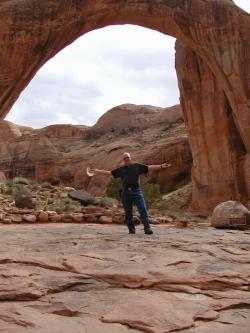
Lone Rock Campground
Lake Powell, Arizona
I have been slow to write lately. But I have to get some of this down now, or I may lose it. I just got back from a trip to Rainbow Bridge National Monument. When Teddy Roosevelt came here, it took a week on mule and horseback, in the care of laconic Piute and Navajo guides. It was, as he recorded, a "toilsome" journey.
I traveled in a large launch, on the waters of Lake Powell, for half a day. There was a Navajo guide and pilot, but she was anything but laconic. Her name was Charlotte, and she kept up a rapid and informative patter about the sights all along the way. Unfortunately I only heard about half of it over the drumming of the hull against the water, and the blasts of wind that kept trying to take my hat off. That's okay. It may have been more comfortable down below, but up top is where I had to be. My head was swiveling so much, it's a wonder I didn't screw myself down into the superstructure.
"It's still a little nippy in March, especially at night, but the weather gets better every day. Right after the end of May, it starts to get hot and crowded. Kids are out of school. April and May are best. It stays hot until October."
Lake Powell from March to May - what a great start for a trip to Alaska! Maybe next year. Maybe next year.
I believe she said the Lake was 184 miles long. The map shows 139 miles from the dam to Hite Marina, and there's many miles of canyon past that, as the lake gradually turns into a river again, up near Moab. It was 50 miles by water just from Wahweap Marina to Rainbow Bridge. Three and a half hours, one way.
Most people being pigs, of course, the work never ends.
Charlotte says the old guy running this effort knows the Lake as well as anyone, and is happy to share his secrets. In a week you will pass by many a good fishing spot, colorful campsite, and little known petroglyph. By the end of the week you should have a good start on your BS, majoring in Lake Powell.
If you are feeling spry and adventurous, or just want to do a good deed, you can write for information, or ask any park ranger about it. I should know more in a few days.
That's enough for now. It's time for bed. More later.
Bob

Lone Rock Campground
Lake Powell, Arizona
I have been slow to write lately. But I have to get some of this down now, or I may lose it. I just got back from a trip to Rainbow Bridge National Monument. When Teddy Roosevelt came here, it took a week on mule and horseback, in the care of laconic Piute and Navajo guides. It was, as he recorded, a "toilsome" journey.
I traveled in a large launch, on the waters of Lake Powell, for half a day. There was a Navajo guide and pilot, but she was anything but laconic. Her name was Charlotte, and she kept up a rapid and informative patter about the sights all along the way. Unfortunately I only heard about half of it over the drumming of the hull against the water, and the blasts of wind that kept trying to take my hat off. That's okay. It may have been more comfortable down below, but up top is where I had to be. My head was swiveling so much, it's a wonder I didn't screw myself down into the superstructure.
"It's still a little nippy in March, especially at night, but the weather gets better every day. Right after the end of May, it starts to get hot and crowded. Kids are out of school. April and May are best. It stays hot until October."
Lake Powell from March to May - what a great start for a trip to Alaska! Maybe next year. Maybe next year.
I believe she said the Lake was 184 miles long. The map shows 139 miles from the dam to Hite Marina, and there's many miles of canyon past that, as the lake gradually turns into a river again, up near Moab. It was 50 miles by water just from Wahweap Marina to Rainbow Bridge. Three and a half hours, one way.
Most people being pigs, of course, the work never ends.
Charlotte says the old guy running this effort knows the Lake as well as anyone, and is happy to share his secrets. In a week you will pass by many a good fishing spot, colorful campsite, and little known petroglyph. By the end of the week you should have a good start on your BS, majoring in Lake Powell.
If you are feeling spry and adventurous, or just want to do a good deed, you can write for information, or ask any park ranger about it. I should know more in a few days.
That's enough for now. It's time for bed. More later.
Bob
October 16, 2004
Rare Sights, and a New Wrinkle
Navajo National Monument
Arizona
Fortunately both he and his wife are under 6 feet tall, and thus able to stand up in the thing.
Don't you hate it when that happens?
Jake's been traveling 4 years now, long enough to grow his hair out as long as his beard, which makes him resemble a somewhat raggedy dandelion in a mild breeze. If you can imagine a dandelion with a Bahstan accent.
For someone who wants to haul multiple bikes, a short boat, a workshop, etc, this in combination with any trailer is a pretty good alternative to a toy hauler. The whole back opens up with the standard overhead door. The only problem he's had is that the Aerolite is only 7 feet wide, the van is 8 feet, and it's hard to see the rear of the trailer when backing up.
Bump. O, was that your cat? You want it back?
If you don't want the trailer, the van still might be a good start on a small home-made motorhome. His rig is standard, with a 350 auto, but these trucks can be had with a variety of engines and transmissions at extra cost.
And if you paint it dark brown you can park it right in the middle of the street in almost any town from coast to coast!! :o)
Bob
Arizona
Fortunately both he and his wife are under 6 feet tall, and thus able to stand up in the thing.
Don't you hate it when that happens?
Jake's been traveling 4 years now, long enough to grow his hair out as long as his beard, which makes him resemble a somewhat raggedy dandelion in a mild breeze. If you can imagine a dandelion with a Bahstan accent.
For someone who wants to haul multiple bikes, a short boat, a workshop, etc, this in combination with any trailer is a pretty good alternative to a toy hauler. The whole back opens up with the standard overhead door. The only problem he's had is that the Aerolite is only 7 feet wide, the van is 8 feet, and it's hard to see the rear of the trailer when backing up.
Bump. O, was that your cat? You want it back?
If you don't want the trailer, the van still might be a good start on a small home-made motorhome. His rig is standard, with a 350 auto, but these trucks can be had with a variety of engines and transmissions at extra cost.
And if you paint it dark brown you can park it right in the middle of the street in almost any town from coast to coast!! :o)
Bob
October 5, 2004
Out of Nowhere
Cottonwood Campground
Near Jemez Springs
New Mexico
About the middle of the morning I walked up to the camp host's trailer. She took a while getting to the door.
"Miz...Radel?" I read the name off the sign. "I was wondering if you could tell me where I could find the nearest laundromat?"
"Oh, my..." she looked at me. "There isn't one."
"There isn't one?"
"Well, maybe in Rio Rancho. That'd be the closest."
I was stunned. "Fifty miles? That's the closest? Nothing down in the pueblo?"
"No..." There was a voice from inside. "Wait just a minute, please..." She went back into the gloom. A few minutes went by. I was seeing the whole day disappearing into my laundry bag. Then she opened the door.
"I'm sorry. My husband...he just got out of the hospital. Pneumonia."
"Oh...well, never mind then. Sorry to bother you."
"Wait. I guess... I guess you could use mine..."
This was unexpected. "Your washer?"
"Yes. It's out in the shed."
"No. No, that's a kind offer, but I don't want to bother you now."
She sighed. "You know, I think I'm way beyond being bothered. Go ahead. It's open. You got soap?"
And it was right about then that I discovered just what a low snake I really am. I didn't want to drive a hundred miles to do laundry. So I took her up on it. If I'd been her, I'd have probably chased me off with a chain saw.
"Well, okay, if you don't mind. I'll be quiet." She nodded, and closed the door.
I got the wash done. She didn't come out again. Later on, while I was eating a sandwich outside at the picnic table, my neighbors came over to check my permit. This lovely couple were Rich and Ellen Jerome from Florida. They were just campers like me, but they had volunteered to do Peg Radel's job for her while she got some rest. Turns out this was just the latest of a whole series of ambulance rides over the last few weeks.
"Peg's just worn out. Clyde's got lung cancer. They keep sending him home, 'cause there's nothing they can do."
Now I really felt bad.
"Tell her...tell her if there's anything I can do, just let me know. Maybe go to the store or something..."
"We'll tell her."
And I'm sure they did. But I never heard anything. I kept walking by the trailer, but I sure wasn't going to knock on the door and wake them up just to tell them I wanted to help. I'm not quite that self-absorbed.
Finally decided the best thing to do was just let them alone. I carry some firewood over to the Jeromes. We talked a lot about Florida, and full-timing.
Gradually it became clear there wasn't any way I was ever going to make up to Peg for that load of wash. Not directly anyhow.
But I definitely owe somebody a favor out there. It's open-ended, and it's on the books.
You know, this is one aspect of full-timing I hadn't considered. Clyde and Peg had been hosting in this campground, year round, for four years. Gradually he had gotten sicker and sicker. This flat spot out in the middle of nowhere was their home. No family anywhere near by.
And he was dying, as we all must.
But out of that nowhere came plenty of help, from complete strangers. Such help as could be had. Different campers volunteered. There was more people than things to do. Rich and Ellen changed their travel plans to stay there longer, and Peg's work was taken care of. Another young couple volunteered to spell them. The Sheriff came by to check on the situation.
While I was there, Clyde had two more trips into the VA hospital in Albuquerque. And came back. He hung in there, and things worked out, day by day. After a couple of weeks, I moved on. There was no lack of hands.
All these people working together, and all of them strangers a couple of weeks ago. Just goes to show, we are not as alone as we think we are. No matter where we are. Even us gypsy full-timers.
Where there's people, there's help.
Whether we know it or not.
Bob
Near Jemez Springs
New Mexico
About the middle of the morning I walked up to the camp host's trailer. She took a while getting to the door.
"Miz...Radel?" I read the name off the sign. "I was wondering if you could tell me where I could find the nearest laundromat?"
"Oh, my..." she looked at me. "There isn't one."
"There isn't one?"
"Well, maybe in Rio Rancho. That'd be the closest."
I was stunned. "Fifty miles? That's the closest? Nothing down in the pueblo?"
"No..." There was a voice from inside. "Wait just a minute, please..." She went back into the gloom. A few minutes went by. I was seeing the whole day disappearing into my laundry bag. Then she opened the door.
"I'm sorry. My husband...he just got out of the hospital. Pneumonia."
"Oh...well, never mind then. Sorry to bother you."
"Wait. I guess... I guess you could use mine..."
This was unexpected. "Your washer?"
"Yes. It's out in the shed."
"No. No, that's a kind offer, but I don't want to bother you now."
She sighed. "You know, I think I'm way beyond being bothered. Go ahead. It's open. You got soap?"
And it was right about then that I discovered just what a low snake I really am. I didn't want to drive a hundred miles to do laundry. So I took her up on it. If I'd been her, I'd have probably chased me off with a chain saw.
"Well, okay, if you don't mind. I'll be quiet." She nodded, and closed the door.
I got the wash done. She didn't come out again. Later on, while I was eating a sandwich outside at the picnic table, my neighbors came over to check my permit. This lovely couple were Rich and Ellen Jerome from Florida. They were just campers like me, but they had volunteered to do Peg Radel's job for her while she got some rest. Turns out this was just the latest of a whole series of ambulance rides over the last few weeks.
"Peg's just worn out. Clyde's got lung cancer. They keep sending him home, 'cause there's nothing they can do."
Now I really felt bad.
"Tell her...tell her if there's anything I can do, just let me know. Maybe go to the store or something..."
"We'll tell her."
And I'm sure they did. But I never heard anything. I kept walking by the trailer, but I sure wasn't going to knock on the door and wake them up just to tell them I wanted to help. I'm not quite that self-absorbed.
Finally decided the best thing to do was just let them alone. I carry some firewood over to the Jeromes. We talked a lot about Florida, and full-timing.
Gradually it became clear there wasn't any way I was ever going to make up to Peg for that load of wash. Not directly anyhow.
But I definitely owe somebody a favor out there. It's open-ended, and it's on the books.
You know, this is one aspect of full-timing I hadn't considered. Clyde and Peg had been hosting in this campground, year round, for four years. Gradually he had gotten sicker and sicker. This flat spot out in the middle of nowhere was their home. No family anywhere near by.
And he was dying, as we all must.
But out of that nowhere came plenty of help, from complete strangers. Such help as could be had. Different campers volunteered. There was more people than things to do. Rich and Ellen changed their travel plans to stay there longer, and Peg's work was taken care of. Another young couple volunteered to spell them. The Sheriff came by to check on the situation.
While I was there, Clyde had two more trips into the VA hospital in Albuquerque. And came back. He hung in there, and things worked out, day by day. After a couple of weeks, I moved on. There was no lack of hands.
All these people working together, and all of them strangers a couple of weeks ago. Just goes to show, we are not as alone as we think we are. No matter where we are. Even us gypsy full-timers.
Where there's people, there's help.
Whether we know it or not.
Bob
October 4, 2004
Another Wilderness Fridge Raid
Jemez Springs
New Mexico
Well, podnahs, I've written before of my gourmandizin' adventures out here along the trail. Right now I'm sittin' on the bank of the Jemez River, having lunch.
The biggest problem in the boonies seems to be too much food rather than too little. I tend to overbuy at the grocery store when I pass through what passes for civilization, and rather than trouble with cleaning out the fridge I just push the dated stuff to the back. Much like the venerable wall cemetery practices in the French Quarter, down in Noo Orleens.
If it weren't for the starving Armenians, it wouldn't matter.
You know about them. Every family has their own version of the starving Armenians, some popular, pitiful, and alarming tale of ancient deprivation, a fabled time when a miserable ragtag band of neglected humans were insanely happy just to suck rocks, which the Lord provided. They are continually resurrected, through the generations, to remind us that there are Those Less Fortunate, Who'd Like To Have What's Sitting On Our Plates Right Now.
"What do you mean, you don't like turnips? Eat your greens and be grateful. What did you just say in the Blessing? Right. "God is great, and God is good". You could have been born in Armenia, you know, a stick-thin victim of the parsimonious harvests of heathen lands. What? They're Christians? Armenians? Don't you get smart with me. I didn't slave over a hot stove just to raise a couple of smartmouthed, willful, vitamin-deficient children.
You eat that. It's Good For You. And sit up straight, while you're at it. "
Ah. We never outgrow the lessons of childhood. I think even the most culinarily rigid among you can see why I can't just throw this stuff away. So what if it has more hair than I do?
Sooo, let's take a look. Hmmm. A bag of green beans, getting rather limp. Red onion. A large, gorgeously orange, but somewhat dry and misshapen yam. A forgotten deli ziplock of smoked ham, flattened beneath all that, just past it's prime. Sniff. Just.
Garlic, dill weed, salt and pepper. Cornbread and butter, which tastes good with anything. Have I got an egg for that? Yessss.
Why, it's a feast!
And so it turned out. The only really odd ingredient larger than a bacterium was the yam. But it turned out right tasty, and made a more colorful dish than the usual bland pile of white potatoes.
Boil it up, you'll like it. Beats driving into town. Especially in an area where "town" is a nebulous concept, possibly in another time zone.
Unlike almost anything else you might be eating, this doesn't taste like chicken.
Besides, you know it's Good For You.
Bob
New Mexico
Well, podnahs, I've written before of my gourmandizin' adventures out here along the trail. Right now I'm sittin' on the bank of the Jemez River, having lunch.
The biggest problem in the boonies seems to be too much food rather than too little. I tend to overbuy at the grocery store when I pass through what passes for civilization, and rather than trouble with cleaning out the fridge I just push the dated stuff to the back. Much like the venerable wall cemetery practices in the French Quarter, down in Noo Orleens.
If it weren't for the starving Armenians, it wouldn't matter.
You know about them. Every family has their own version of the starving Armenians, some popular, pitiful, and alarming tale of ancient deprivation, a fabled time when a miserable ragtag band of neglected humans were insanely happy just to suck rocks, which the Lord provided. They are continually resurrected, through the generations, to remind us that there are Those Less Fortunate, Who'd Like To Have What's Sitting On Our Plates Right Now.
"What do you mean, you don't like turnips? Eat your greens and be grateful. What did you just say in the Blessing? Right. "God is great, and God is good". You could have been born in Armenia, you know, a stick-thin victim of the parsimonious harvests of heathen lands. What? They're Christians? Armenians? Don't you get smart with me. I didn't slave over a hot stove just to raise a couple of smartmouthed, willful, vitamin-deficient children.
You eat that. It's Good For You. And sit up straight, while you're at it. "
Ah. We never outgrow the lessons of childhood. I think even the most culinarily rigid among you can see why I can't just throw this stuff away. So what if it has more hair than I do?
Sooo, let's take a look. Hmmm. A bag of green beans, getting rather limp. Red onion. A large, gorgeously orange, but somewhat dry and misshapen yam. A forgotten deli ziplock of smoked ham, flattened beneath all that, just past it's prime. Sniff. Just.
Garlic, dill weed, salt and pepper. Cornbread and butter, which tastes good with anything. Have I got an egg for that? Yessss.
Why, it's a feast!
And so it turned out. The only really odd ingredient larger than a bacterium was the yam. But it turned out right tasty, and made a more colorful dish than the usual bland pile of white potatoes.
Boil it up, you'll like it. Beats driving into town. Especially in an area where "town" is a nebulous concept, possibly in another time zone.
Unlike almost anything else you might be eating, this doesn't taste like chicken.
Besides, you know it's Good For You.
Bob
October 3, 2004
Inarticulate
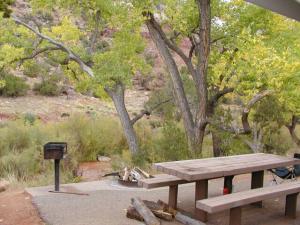
Jemez Springs
New Mexico
You may have noticed that I spend a lot of time trying to get off by myself. Some have wondered why. Let me see if I can tell you.
Two years ago I retired from the Austin Fire Department. Chapter closed. What now? Just what the hell is all this travel for?
Well, I'm looking for someone. He's around here somewhere. Way back when, he used to write letters to the man he thought he would become. He asked for help. In the end he got precious little of it. Sometimes he thought there was a nudge or two, but for the most part there was just this formless buzzing silence in the night.
After a while he got involved in other stuff.
Then he disappeared.
I've got the letters. I'm trying to get in touch with him. But his is such a faint voice. It may be distance. It may be merely reticence. But he is easily overcome by the incessant "me, me, me" that clamors in my mind.
Add the bright babbling of others, and he fades out altogether. It is a bit like being haunted by children you never had. All those possibilities.
Think of it. One morning, deep in the sports pages, you hear a knock. You take the paper with you, still reading, your glasses sliding down unnoticed on your nose. Opening the door, you find a grown man standing there, someone you have never seen before. And yet he seems familiar. Very familiar. For a long moment neither of you speak. And then he grins, holds out his hand, and says "Hi, Dad."
A stormy meeting, surely, full of portents and silences. Silences. That's the key. Silence is not always inarticulate. It is entirely possible there will be nothing to say. But if there is nothing to say, I want to hear him say it.
First I have to find him. For me it is a matter of memory. For him it must be something stranger still.
And so it is that I always seek a modest solitude in my travels. Silences. Sometimes, like everyone, I hear voices on the wind. When that happens, I try to pay attention.
I've gotten pretty close. Once on a ferry halfway up the inside passage, I could feel him breathing right beside me. Oddly, it wasn't scary at all. It felt comfortable. It felt safe.
I have to keep trying. If I am not to be the fireman any longer, who am I to be? He once held all the possibilities within him. I want to ask him certain questions, much as he asked me. Maybe I'll have better luck.
What it is that I need to do? I think he knows.
Meanwhile, I've found a wonderful campsite here, next to the Jemez River. If you want voices in your dreams, a burbling river is right up there with the wind.
The water runs red with silt from the recent rains, and a cottonwood, shaggy with green and gold, droops over it. The tree is bent, and a little raggedy. One limb is a snag. But it is quite alive.
The leaning leaves stir slightly. Perhaps they mean to fall.
To the right is a small arroyo, and empty land beyond. To the left a site as yet unoccupied. It could be worse.
Wait. Did you hear that?
Bob
September 30, 2004
Moving On Again
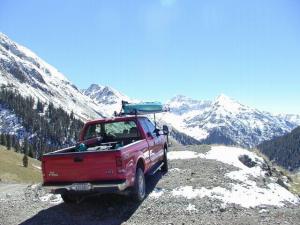
Haviland Lake
Colorado
It's been a lovely and a lazy stay here. But over the last week there's been two snowstorms just 10 miles from here, up in the pass. It's below freezing at night. And for the last three days it's been raining down here.
Time to move on.
I've done what I wanted. Taken a deliberate approach to traveling. A week here, two weeks there. Three weeks at Haviland. Between breaking my big toe and learning to use the hammock, I've perforce gotten a bit of sitting and reading done, when not at nap practice. This rigorous discipline has kept my gas bills under $200 a month.
Even at 8 mpg.
Too much deliberation, however, is the opposite of travel. Tomorrow I'm headed down to Albuquerque, to take in the hot air balloon festival. Perhaps I can convince someone that I'd make a lively bit of ballast.
30 Sep 04 Chaco Canyon New Mexico
Got here yesterday, late afternoon. The last 20 miles at 10 mph, over a rain-rutted washboard dirt road that put the test on the permanence of my fillings. Amazing I went that fast. In places, the steering wheel almost jerked completely out of my hands.
There's only one campground at Chaco Culture National Historical Park. Thank God it wasn't full. I'd hate to go back down that road in the dark.
Expertise wasn't enough to please everyone, though. I overheard one old grump fussing to his wife on the way back to the parking lot:
| "I like'em to be in uniform. And with a haircut. The Parks are all going straight to hell." | 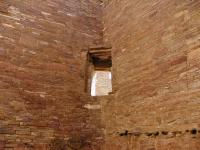 |
I suspect this same guy voted for the people that cut park funding. He was lucky to get a volunteer to talk to him, long hair or not. Otherwise he'd be even more pissed off, wandering around down here with a squinty look and a printout.
| It's been mostly peaceful in the campground this afternoon. After the abundant green of Colorado, it's entertaining just to sit and watch the light change on the canyon walls. | 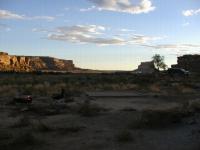 |
But not entirely peaceful. For half an hour everybody got to join in the Great Kitten Hunt. A guy with a British accent wandered disconsolately from site to site carrying a short rope with a tiny collar dangling down from the end of it. Kitty had slipped the noose, and gone off hunting in the rocks. My neighbor cheered the guy up with tales of the voracious fox and bobcat hordes lurking hungrily on the bluffs above.
Then we all formed a posse and went meowing around. I'm happy to say that the little black thing was finally found mewling under a motorhome.
2 Oct 04 Fenton Lake State Park New Mexico
The electric sites here at the park are a bargain at $14. The place was empty when I drove in. They had a bad fire here a couple of years ago, that swept right down to the south side of the lake. As a result, they've been thinning trees over on this side, and there is a plenitude of firewood for the cutting. I laid about mightily with the chain saw, piled the truck high with logs.
Some of it was greener inside than I liked, so I spent an hour splitting it into sticks of a size likely to dry sometime this century.
Later in the evening Friday, as you might expect, the sites filled up with several large families. Lots of screaming kids chasing around scaring each other in the dark. This went on till around 11, when the ranger came by and told them to shut it down. One of the advantages of having the ranger live right up the hill.
Tomorrow I'm moving back down to Jemez Springs. I passed by several quiet looking sites on the way up yesterday. Seems like I spend half my time just hunting for a quiet place in the woods, and the other half gathering firewood.
Hunter-gatherer, that's me. Travel sure is exciting.
But it is also mundane, and anyone who doesn't think so hasn't done much of it. Even life out here in the passing lane still has to be maintained. Water has to be found, and propane, and groceries, and occasionally an electric outlet. Laundry still piles up.
Which reminds me.
Bob
September 15, 2004
In the Pines, In the Pines
Haviland Lake
Colorado
I am living on the shore of the Lake, along a stretch of campsites known informally as "Texas Row". We've had a couple of useful Newmexicanos, but soon as they pull out there's always a Texan of some sort hovering nearby, waiting to get in. Nary a Coloradoite in the place, save perhaps the assistant camp host.
Texans tend to dominate the backcountry crowd here in the summer and fall, to the generalized complaint of the townie natives, who nonetheless take our money with abandon. Texans themselves complain mightily about each other within the Sovereignty Itself, but tend to throttle back a bit out here in the dependent territories.
There are so many volunteers already available, when it comes to carping.
I can generally recognize a Texan right off. Take Weldon from Comanche, two sites up. First thing he said to me was "If you see anything you need over at my place, just go get it. No need to ask. I got most everything."
Now that's a Texan in the woods.
Weldon goes well beyond the normal concept of camping. What he does is create an encampment. The other day he came by on the road while I was reading.
"Wanta take a ride?"
"Where to?"
"You need firewood. I got a chain saw. Don told me where there was some dead trees. How about it?" We came back with about a third of a cord, as much as we could load in the back of his Tahoe. He cut up about as much more and left it stacked on the ground.
"Somebody else might come along. Might as well finish up what we brought down."
Add a light hatchet, gloves, and a cheap electric chain saw, and you have all the kit an RVer might ever need, to keep himself in campfires. Assuming there's dead trees where you are.
They are everywhere in Colorado. The bark beetle is deadly to pines, especially the great Ponderosas here along the lake. There is a constant rain of brown needles from these so-called evergreens. I suppose 4 or 5 years from now, if you come here, you'll be camping among the snags and wondering what all the fuss used to be about.
Right now this is a cool, tree-shaded, light-dappled, wind-ruffled, critter-filled paradise. But the needles are ever falling, falling, falling. Softly covering the deep floor of the woods.
Coming down the Dolores from Telluride a couple of weeks ago, I was looking for early color along the mountainsides, and exclaimed to myself when I saw the rusty lines among the green. How pretty.
Right.
Then I shut my mouth. It wasn't pretty at all. Those trees are dead. The bark beetles got 'em, and the pests are spreading. The only defense pines have here is a sticky sap, which they can just manage when there's plenty of rain. There's been a drought for the past 5 years.
Last year the snows came. It may be too late.
In any case, there won't be a shortage of firewood for a few years yet. Lots of dead and dying trees in these parts. My hammock is tied between two of them. As the trees sway in the breeze, the gentle rocking effect is like sleeping on a small boat in the water.
While wrestling a stump over to the table to be split a couple of days ago, I stumped my right big toe on an upright piece of iron the forest service had helpfully provided. It was welded to the grate on the fire ring. I was hobbling around the next day in houseshoes, and my new Texas neighbor offered his wife's services.
She's an Acupuncturist.
She asked me where it hurt. No, I didn't have to disrobe. Just a general idea. Outside of the ball of the right foot? She took my right pinkie in her hand, and started pressing the inside of it with a car key, just by the nail. Does this hurt? Where does it hurt the most?
"Okay, now hold that spot." She bent down. "The scientific part of this," she chuckled, "is picking out just the right rock." The one she chose was tiny and pointed, like a grain of sand. She pressed it into the spot selected on my pinky.
"Does your foot hurt now?"
"Now whenever your foot hurts, just press this spot. Leave it there a few days. It won't cure whatever's wrong with your foot, but it will alleviate pain."
And it did. To hell with Ibuprofen. In partial trade, I sat in the sun and sharpened her knives. Weldon brought over a pile too.
I started to ask her, just in case, if she had anything for a broken heart. But no. The only rocks suitable are probably rattling around in my head. And how would I ever apply the appropriate pressure?
There's another reason I didn't ask, of course.
I was afraid she might tell me.
Bob, on line, in the pines.
Colorado
I am living on the shore of the Lake, along a stretch of campsites known informally as "Texas Row". We've had a couple of useful Newmexicanos, but soon as they pull out there's always a Texan of some sort hovering nearby, waiting to get in. Nary a Coloradoite in the place, save perhaps the assistant camp host.
Texans tend to dominate the backcountry crowd here in the summer and fall, to the generalized complaint of the townie natives, who nonetheless take our money with abandon. Texans themselves complain mightily about each other within the Sovereignty Itself, but tend to throttle back a bit out here in the dependent territories.
There are so many volunteers already available, when it comes to carping.
I can generally recognize a Texan right off. Take Weldon from Comanche, two sites up. First thing he said to me was "If you see anything you need over at my place, just go get it. No need to ask. I got most everything."
Now that's a Texan in the woods.
Weldon goes well beyond the normal concept of camping. What he does is create an encampment. The other day he came by on the road while I was reading.
"Wanta take a ride?"
"Where to?"
"You need firewood. I got a chain saw. Don told me where there was some dead trees. How about it?" We came back with about a third of a cord, as much as we could load in the back of his Tahoe. He cut up about as much more and left it stacked on the ground.
"Somebody else might come along. Might as well finish up what we brought down."
Add a light hatchet, gloves, and a cheap electric chain saw, and you have all the kit an RVer might ever need, to keep himself in campfires. Assuming there's dead trees where you are.
They are everywhere in Colorado. The bark beetle is deadly to pines, especially the great Ponderosas here along the lake. There is a constant rain of brown needles from these so-called evergreens. I suppose 4 or 5 years from now, if you come here, you'll be camping among the snags and wondering what all the fuss used to be about.
Right now this is a cool, tree-shaded, light-dappled, wind-ruffled, critter-filled paradise. But the needles are ever falling, falling, falling. Softly covering the deep floor of the woods.
Coming down the Dolores from Telluride a couple of weeks ago, I was looking for early color along the mountainsides, and exclaimed to myself when I saw the rusty lines among the green. How pretty.
Right.
Then I shut my mouth. It wasn't pretty at all. Those trees are dead. The bark beetles got 'em, and the pests are spreading. The only defense pines have here is a sticky sap, which they can just manage when there's plenty of rain. There's been a drought for the past 5 years.
Last year the snows came. It may be too late.
In any case, there won't be a shortage of firewood for a few years yet. Lots of dead and dying trees in these parts. My hammock is tied between two of them. As the trees sway in the breeze, the gentle rocking effect is like sleeping on a small boat in the water.
| Restful it is, right up until needles start pelting you. Well, nobody ever told me hammock lessons would be easy. Mine has been empty more often than not. | 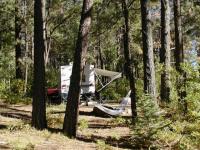 |
While wrestling a stump over to the table to be split a couple of days ago, I stumped my right big toe on an upright piece of iron the forest service had helpfully provided. It was welded to the grate on the fire ring. I was hobbling around the next day in houseshoes, and my new Texas neighbor offered his wife's services.
She's an Acupuncturist.
She asked me where it hurt. No, I didn't have to disrobe. Just a general idea. Outside of the ball of the right foot? She took my right pinkie in her hand, and started pressing the inside of it with a car key, just by the nail. Does this hurt? Where does it hurt the most?
"Okay, now hold that spot." She bent down. "The scientific part of this," she chuckled, "is picking out just the right rock." The one she chose was tiny and pointed, like a grain of sand. She pressed it into the spot selected on my pinky.
"Does your foot hurt now?"
| I'll be damned. No, it doesn't. It had been throbbing. She taped the rock in place with a piece of band-aid. | 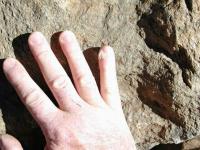 |
"Now whenever your foot hurts, just press this spot. Leave it there a few days. It won't cure whatever's wrong with your foot, but it will alleviate pain."
And it did. To hell with Ibuprofen. In partial trade, I sat in the sun and sharpened her knives. Weldon brought over a pile too.
I started to ask her, just in case, if she had anything for a broken heart. But no. The only rocks suitable are probably rattling around in my head. And how would I ever apply the appropriate pressure?
There's another reason I didn't ask, of course.
I was afraid she might tell me.
Bob, on line, in the pines.
Subscribe to:
Posts (Atom)
